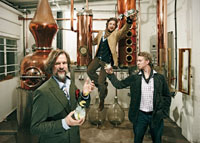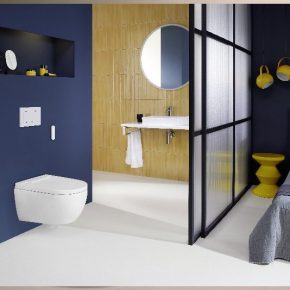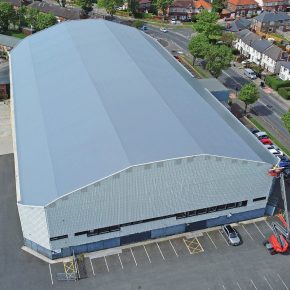
Steam-based system specified for artisanal gin distillery
The Project
Established in Hammersmith in 2009, Sipsmith Distillery uses the first copper still to launch in London for close to 200 years, crafting uncomprimising, artisanal gins and vodkas.
Established in 2009, Sipsmith Distillery crafts artisanal gins and vodkas.
The distillery gives female names to each of its stills and the first, Prudence, orginally used electricity to power elements in the steam jacket surrounding it.
As Sipsmith’s export market grew, production increased, and the founders realised that additional stills were required to meet demand. After Constance, the distiller’s third and larger still, Sipsmith decided to switch from an electrically-heated process to one using a steam boiler.
Fulton Sales and Marketing Manager Doug Howarth says: We visited Sipsmith Distillery when they were using German electrically-powered stills but wanted to install a gas-fired steam boiler for their new, larger premises.
Our area manager discussed the specifications and options with them and an order was subsequently placed for a Fulton 20J vertical boiler and associated ancillaries. We continued to provide assistance and technical support throughout the installation and during commissioning.
Sipsmith Distillery uses the first copper still to launch in London for close to 200 years.
Steam-based systems
Many craft breweries and distilleries start off using electric, however, as demand and output grows, many move to steam-based systems such as those from Fulton. Whilst electric systems can be efficient, they only heat the water required for the steam jacket, and are therefore not as manageable or controllable as steam boiler-based systems.
Felix James, Head of Operations at Sipsmith Distillery says: For us, the difference is the same as cooking using electric or gas. Prudence and Patience both used electric elements initially but, to control the water temperature, you could only switch on or off the four elements in the steam jacket.
And then there would be a delayed response as it would take time to transfer the energy through to the stills. With steam, once it’s turned down or off, the stills are very quick to shut down or respond to the temperature change.
The Process
Unlike big plant’ distillation processes that can produce a spirit in less than two hours, each Sipsmith gin or vodka distilling process takes up to eight or nine hours to complete.
- Firstly, steam from the Fulton 20J boiler is gradually introduced into the still’s steam jacket, until the alcoholic wash inside the still reaches 78.3 degrees centigrade.
- As the wash boils and turns to vapour, it rises through the still’s helmet and swan’s neck before returning to liquid form in the condenser.
- After the initial heads’ cut (containing methanol) and the final tails’ cut are disposed of, the 1,500-litre Constance produces approximately 950 litres at still strength (82% for the gin and 90% for the vodka).
- This distilled liquid is then cut with water to create a bottling strength product that produces up to 2,500 bottles.
- The smaller 300 litre stills Prudence and Patience can produce up to 500 bottles each per run, with Patience currently being used to produce predominantly new products or for product development.
Explaining the reasons for specifying Fulton, Felix mentioned the ties with nearby Fuller’s Brewery which uses Fulton’s boilers in the brewing process:
Fulton are very well respected and, being a UK manufacturer, are very easy to deal with. We undertake our own water analysis every month but do have a service contract with Fulton, which visits the site every three months to conduct its own analysis and check the condition of the boiler and the system.
Latest news

23rd April 2024
Geberit brings Parallel World to Clerkenwell Design Week
Visitors to this year’s Clerkenwell Design Week (21 – 23 May) can step into a parallel world and discover the benefits of cleaning with water, thanks to Geberit.
Posted in Articles, Bathrooms & Toilets, Bathrooms, Bedrooms & Washrooms, Building Industry Events, Building Industry News, Building Products & Structures, Building Services, Exhibitions and Conferences, Innovations & New Products, Interior Design & Construction, Interiors, Plumbing, Restoration & Refurbishment, Retrofit & Renovation
23rd April 2024
Mitsubishi Electric Ecodan Heat Pumps and Water Cylinders to be stocked by The Boiler Shop
Mitsubishi Electric’s full range of Ecodan heat pumps and hot water cylinders are to be stocked by one of the north-west’s best established independent merchants, The Boiler Shop.
Posted in Articles, Building Industry News, Building Products & Structures, Building Services, Facility Management & Building Services, Heating Systems, Controls and Management, Heating, Ventilation and Air Conditioning - HVAC, Plumbing, Posts, Retrofit & Renovation, Sustainability & Energy Efficiency
23rd April 2024
Trio of Senior products used in new Nottingham residential scheme
Solutions from Senior Architectural Systems have helped complete The Barnum – a new residential development on Nottingham’s Queen’s Road.
Posted in Aluminium Products, Articles, Building Industry News, Building Products & Structures, Building Systems, Case Studies, Curtain Walling, Doors, Glass, Glazing, Posts, Restoration & Refurbishment, Retrofit & Renovation, Walls, Windows
22nd April 2024
New EJOT role will develop strategic support for UK flat roofing sector
EJOT UK has taken a major step in the expansion of its support for the flat roofing market by appointing one of its most experienced building envelope fastening specialists as its first sector-dedicated business development manager.
Posted in Articles, Building Industry News, Building Products & Structures, Building Systems, Innovations & New Products, Posts, Recruitment, Restoration & Refurbishment, Retrofit & Renovation, Roofs
 Sign up:
Sign up: